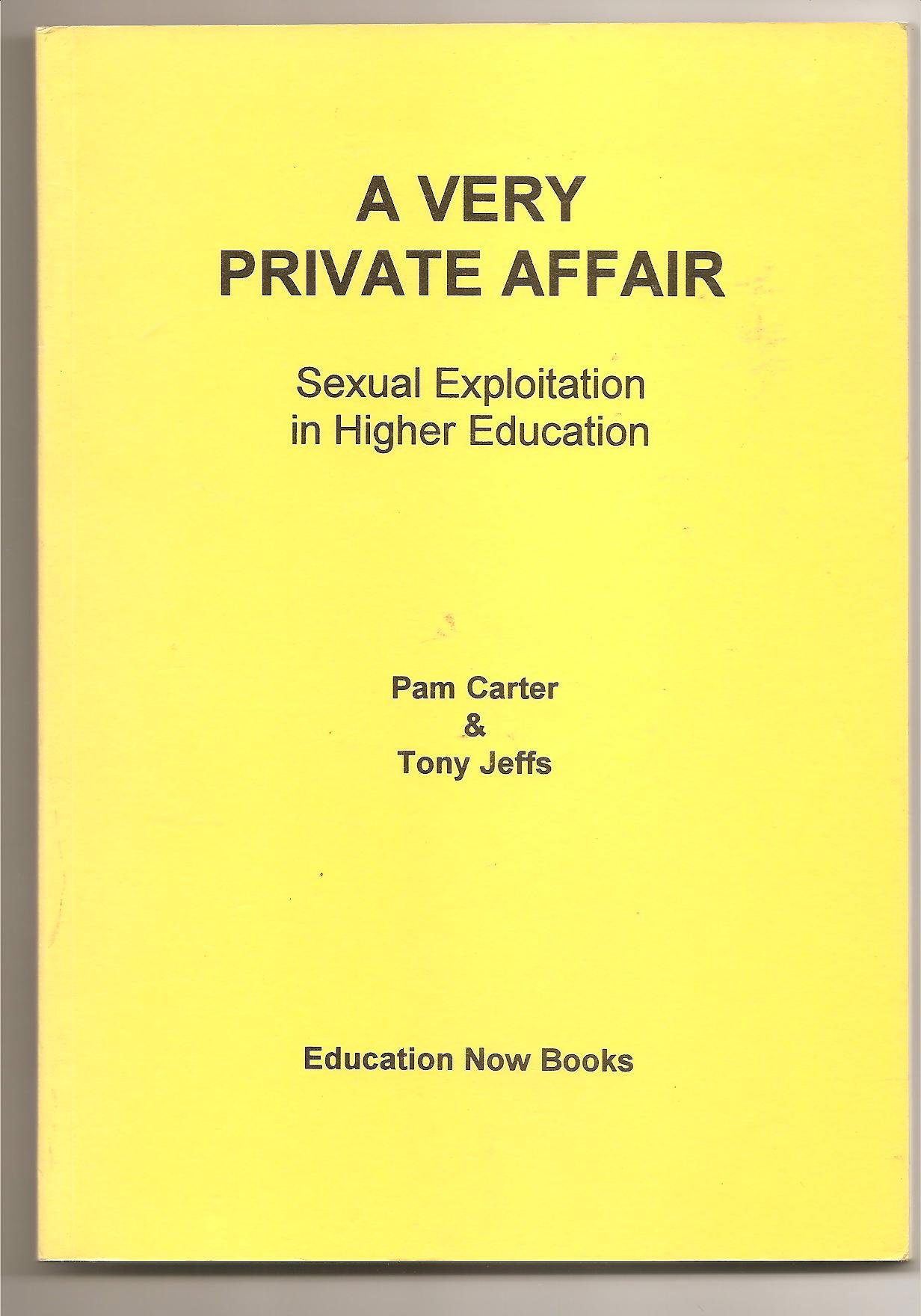Wonkhe is the home of higher education debate, and some days that debate plays across my inbox, DMs, social feeds and blog comments.
The other day, for example, when I suggested that a missing component of the Tertiary Education and Research (Wales) Bill was matters surrounding safeguarding (duty of care, welfare, harassment and sexual misconduct, mental health provision and so on), “ahsdgklajahdsdh“ said:
Most consider existing Health and Safety legislation sufficient. Universities work with adult learners. There is debate to be had about whether the extent to which the sector paternalises adults is a help or a hindrance to their development, success, and wellbeing”.
It’s a view, although not one we tend to hear out loud much these days. It particularly rankled with me because that day I’d been re-reading my copy of “A Very Private Affair”, a 1995 pamphlet on sexual exploitation in higher education that lays out quite clearly the potential for abuses of power in relationships between academics and students whose recommendations lie largely discarded 26 years on.
It also popped up after a few weeks spent talking to former NUS National Womens’ Officers about the agenda on gender-based violence within HE since NUS’ Hidden Marks report in 2010. I’d blocked this out somehow, but in the process I was caused to remember that it was as recent as 2009 when an actual VC made the news for taking to the Times Higher to argue that some women students fantasised about male lecturers and “flaunted” their bodies, which he advised academics to “admire daily to spice up your sex, nightly, with your wife”.
But I was mostly alarmed by the comment in the context of the dispiriting series of blogs and podcasts arising from Al-Jazeera’s Degrees of Abuse series. Elsewhere on the site one of the survivors in the series, Mia Liyanage, lays out a familiar set of concerns about institutional action that seem never to get solved.
And that got me wondering why I’m so wedded to the idea of institutions being exhorted to do the right thing, a frame constantly reinforced by the idea that we regulate providers rather than teachers in higher education.
Poor judgement
The other thing I came across last week is a pretty shocking case surrounding sexual misconduct at a Drama School in the higher education sector called ArtsEd. Between 2012 and 2017 in its School of Musical Theatre, a QC found that there was an overly sexualised environment within a number of music and dance classes. Terms such as “sexy dance”, “wear what you dare” and “naked bond” were notorious and “clearly distressed” some students.
The QC found that some staff members “exercised poor judgment” in their relationships with HE students – with examples in the report of “inappropriate” relationships between staff members and HE students. She found that some staff members had a lack of regard for the physical and mental wellbeing of HE students, and failed in their duty of care.
She also found inconsistencies in how past allegations of misconduct were handled by the leadership – meaning that some staff misconduct was not addressed correctly. And, in some cases, she found that there was a lack of communication with and support for those students that were affected:
It was impossible to challenge the Director of Musical Theatre/Principal and both former staff and students have said in their opinion, it could be “cult like”… similarly students must know that they can raise “issues” or “complaints” at an appropriate level without fear that it will impact on decisions such as casting or grading… It is essential that an appropriate complaints procedure is in place, and that investigations are properly documented… I recommend consideration be given to formalising a process whereby students can seek appropriate student union support”
Following the QC report, its principal Chris Hocking resigned after 23 years at the institution. This week the Stage reported that no findings from the investigation have been referred to the police.
As in many other cases, we’re looking here at a small, closed, tight knit environment where the stakes for “rocking the boat” are impossibly high. Who would be brave enough to complain in a college like this? See also medicine and dentistry, elite student sports teams, the research environment generally, and being made to complain to your own college at Oxbridge.
We surely need all providers to guarantee access to quality independent student support in the event of any complaint or appeal, as I argued here. But the other issue I keep coming back to is the awful choice that students have to make – between reporting via a policing and justice system with a woeful conviction rate that appears to have an institutionalised misogyny problem, and reporting via their university that marks its own homework and is desperate to protect its own reputation.
More regulation?
Part of the problem here is that while we regulate the corporate conduct of providers of teaching and student support, and have various general wheezes that regulate the quality of what they provide, we don’t actually regulate teachers from a professional standards perspective.
Increasingly, I think that represents a major problem.
The debates that have been staged thus far on the regulation of the university teaching profession have naturally tended towards the teaching itself rather than the relationship between teachers (and other student support professionals) and students.
For example the 2003 White Paper called for national professional standards to be agreed through what was to become the Higher Education Academy (now Advance HE) and for those standards, designed and agreed by the sector, to describe competences required for all teaching staff.
One critique I’d level at where we’re at on that agenda is that while Advance HE hosts and holds the UK Professional Standards Framework (PSF) and the associated Fellowship scheme, it’s not been updated since 2011 (and holds a strong familial resemblance to an even older framework developed by SEDA). I’d tentatively suggest that our understanding, for example, of both EDI issues and mental health and their relationship to teaching has moved on sufficiently to warrant a review.
But much more importantly, what that 2003 white paper didn’t cover or envisage was a national register of university teachers, or aspects of teaching and student support that might necessitate being “struck off” for misconduct in the way that other professionals can be.
School/college teachers is too easy a metaphor in the context of a “tertiary” push from governments. So let’s just, for an example, instead take Doctors.
The professionals
The General Medical Council regulates doctors in the United Kingdom. It sets standards, holds a register, quality assures their education and training and investigates complaints.
Members of the public – and crucially patients – can’t just complain about anything. What will be looked at are serious or repeated mistakes in patient care, an abuse of the professional position (for example an improper sexual relationship with a patient), violence, indecency or sexual assault, discrimination and fraud or dishonesty.
Can anyone think of why students shouldn’t be able to make complaints to an external body within a similar frame of abuse of power?
Members of the public can’t complain to the GMC about minor clinical errors, rudeness, disagreements over a diagnosis and medical reports (or, in our sector, “academic judgement”), concerns about other healthcare professionals, waiting lists and access to appointments or the upkeep and condition of hospitals and practices.
Again, why shouldn’t be able to make complaints to an external body within a similar set of qualifying circumstances?
There’s lots to explore on the GMC site. There’s a standard and clear investigation process, resources for those who a complaint is made against, support services for complainants and details of how it implements sanctions. It has a kind of clarity, focus and externality that is just not present when we suggest to students that they can complain locally and internally.
Time to take the register
I don’t know whether the GMC model is the right one. Other professional standards bodies are available, and there is always more to do on prevention internally. I would, for example, make it a professional requirement for anyone that becomes aware of potential harassment or sexual misconduct that is employed by a university to report it in centrally. But the detail isn’t the point here.
I do know that when a student makes a complaint about harassment or sexual misconduct, the “OIA will eventually review the case” and the emerging “or maybe some government appointed culture warrier could review it from a free speech perspective” options wouldn’t cut it.
And when ministers argue that NDAs should be outlawed not least so that perps can’t move between institutions with impunity, this kind of approach would help, while assuring the standards of university teaching to boot.
In the US, the presidents and chancellors of the AAU, an organisation of 66 research universities, voted during their autumn meeting this month to adopt eight new principles, one of which was on sharing findings of sexual misconduct. Surely the US isn’t going to get there before us?
We’ve reached a stage in the development of policy over these issues where even if the OfS “statement of expectations” had regulatory force, I’m not sure it would make that much difference to the situation on campus because the regulatory focus remains the provider rather than the profession(al).
The good news is that a move in this direction can and should improve the professional standing of the university teaching profession, prevent perps from moving around the sector with impunity, save individual universities time and money, and build trust in victims of harassment and abuse to raise their issues. Where’s the downside?














Really interesting article, Jim, and one to reflect upon from personal experience as a student, lecturer, and now senior manager. Thank you.
Great article (again) Jim. Personally, I think that there’s another aspect to discuss here. At the institutions I’ve worked at, students are advised to use the university complaints process when there is accusation of improper behaviour against a staff member. Students are encouraged to use the informal stage (stage 1) in the first instance, which is to raise the concerns with the programme leader (a colleague of the accused staff member). Even if we bypass stage 1 and go direct to stage 2 (the formal stage) the investigation is instigated by another internal staff member of the university complaints team,… Read more »